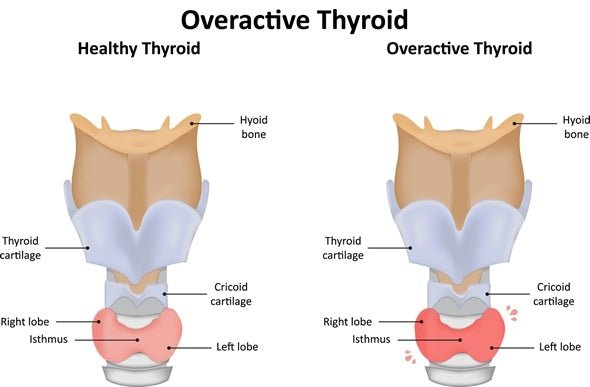
How to Improve Your Thyroid Health
How to Improve Your Thyroid Health
You already know the importance of all the organs in your body, even if you're unsure of their exact function. The functions of the heart, lungs, and brain are common knowledge, but what about your thyroid? You might know that if you're feeling run-down, even when nothing else changes in your life, there's a possibility that your thyroid health may not be optimal. But without knowing anything about your thyroid, how can you be sure?
According to recent statistics, around 27 million people across the United States have a thyroid disorder, and about half of those have never received a diagnosis.
Understanding the organs inside your body and knowing how they should behave is the first step to identifying a possible problem. Let's start assessing your thyroid health by first identifying its function.

What is Your Thyroid?
Your thyroid is a butterfly-shaped gland in your neck that is part of your endocrine system. It produces hormones that affect your energy, weight, and every cell and organ in your body. You can find it below your Adam's apple (if you are a man), with each lobe sitting along your windpipe.Given its essential function in the body, you want to keep it healthy by taking care of it and having it checked if you suspect it isn't functioning correctly.
How Does the Thyroid Work?
Your thyroid takes iodine from the foods you eat, combines the iodine with an amino acid, and produces the thyroxine and triiodothyronine hormones your body needs. Then the gland releases these hormones into your blood, where they move throughout your body to regulate and support your metabolism.
The fact is, every cell in your body depends on the hormones your thyroid produces if they are to function correctly. Without these thyroid hormones, your cells would not have a stable metabolism.

Possible Thyroid Issues
If your thyroid gland isn't doing its job, you can develop disorders that you and your doctor need to address. Some of these disorders and problems include:- Hyperthyroidism: when you have an overactive thyroid
- Hypothyroidism: when you have an underactive thyroid
- Hashimoto's Disease: a chronic hereditary condition that causes hypothyroidism
- Graves' Disease: an autoimmune disease that can cause hyperthyroidism
- Goiter: a symptom of a hyperthyroid presenting as an enlarged thyroid gland
- Thyroid nodules: non-symptomatic growths inside or on the thyroid gland
In addition to the above, the following conditions can keep your thyroid from functioning its best.
Thyroiditis
Thyroiditis is a thyroid gland inflammation that prevents your thyroid from producing the needed amount of hormone to support your cells. Thyroiditis comes in several different forms, including Hashimoto's, subacute, silent, postpartum, drug-induced, acute, and radiation-induced.Postpartum Thyroiditis
Postpartum thyroiditis usually only temporarily affects your thyroid's hormone production. As the name implies, postpartum thyroiditis is the inflammation of the thyroid gland that happens after pregnancy.Non-Functioning Thyroid
There are times when, from birth, the thyroid never functions as it should. A non-functioning thyroid can lead to mental and physical development problems throughout a person's life.Risk Factors of Thyroid Problems
Anyone can develop problems that affect their thyroid health, but there are a few common risk factors to keep in mind. In addition to the disorders mentioned above, genetics also play a part in your overall thyroid health. If you have thyroid issues in your family history, the chance that you will have a thyroid problem increases.Some other risk factors include your gender, age, presence of autoimmune diseases, pituitary gland problems, past thyroid trauma, smoking, and iodine contrasts. Stress and certain medications also may increase your risk of developing a thyroid disorder.
Note that women are five times more likely than men to develop thyroid problems, and people over 60 years of age are also at a higher risk.
Symptoms of a Thyroid Problem
How do you know you have a thyroid problem? The answer depends on your specific thyroid issue because each condition has its own symptoms, but here are some of the main signs to look for, separated by the disorder.Hyperthyroidism symptoms might include:
- Sudden weight loss
- Fast heart rate
- Nervousness
- Profuse perspiration
- Increased bowel movement frequency
- Weakness in muscles
- Goiter
- Lighter menstrual cycle than usual
- Excessive tiredness or unexplained depression
- Slow heart rate
- Cold sensitivity
- Numb or tingling hands
- Goiter
- Constipation
- Dry hair and skin
- Heavier menstrual cycle than normal
How to Support the Thyroid Naturally
The best way to support your thyroid naturally is to eat foods that contain the nutrients your thyroid needs to function. You also want to avoid foods that affect the thyroid negatively. Keep in mind that the only nutrient your thyroid uses to produce its hormone is iodine.You probably eat enough iodine in your meals to feed your thyroid's appetite in your everyday diet. If you eat a well-balanced diet and don't have any underlying issues with processing nutrients, your thyroid should get everything it needs from the food you eat.
What Nutrients Are Important for Thyroid Support?
Even though you probably get all the nutrients you need through your diet, you should know which nutrients support your thyroid function. After all, knowledge is power, and if you have an atypical diet, knowing what nutrients you need can be helpful.We already mentioned that your thyroid converts only iodine, so you need to consume this mineral to support its function. But beware that too much iodine can damage your thyroid.
Another nutrient that's essential for thyroid health is selenium. This nutrient helps wake up the thyroid hormones so that the rest of your body can benefit from them. Please note that too much selenium can be damaging, so do not supplement this mineral unless instructed by a licensed physician.
The last nutrient to keep in mind is zinc. This mineral works similarly to selenium in activating your thyroid hormones. Eating a wide variety of foods should fill your body with more than enough zinc to support your thyroid function.
Other nutrients that may support thyroid health include:
- Vitamin B12
- Magnesium
- Copper
- Manganese
- Molybdenum
- L-Tyrosine
- Cayenne pepper
What Foods Help Support the Thyroid?
To support your body as a whole, you want to eat a wide variety of foods that are as fresh as possible. That same logic holds true for thyroid support as well. But if you're going to target your thyroid health and support, be sure to eat foods that contain the nutrients your thyroid and thyroid hormones need to thrive.
To get the proper amount of iodine in your body, be sure to consider eating fish, dairy, eggs, and seaweed. If you have an iodine deficiency, you might want to add iodized salt to your diet. That said, you should only do that under a physician's orders because too much iodine can be damaging.
Some selenium-rich foods you might find in your kitchen include eggs, beans, tuna, sardines, and Brazil nuts. Remember not to supplement selenium unless a doctor suggests that you do so.
Zinc is very common in developed countries worldwide, so just eating your regular diet should be sufficient. You can find zinc in shellfish, beef, and chicken.
Additional Foods
In addition to the foods containing thyroid-supporting nutrients, you will also want to round out your diet with other nutrient-rich foods. These foods will help not only your thyroid health but also the health of your entire body.
Fill your day with fruits, vegetables, grains, seeds, dairy, and non-caffeinated drinks. Aim for eating all the colors of the rainbow—because the more diverse the choices in your diet, the better chance your body has of receiving the nutrients it needs to thrive.
Of course, if you have any intolerance to a particular food, you should avoid it and replace it with a comparable substitute. Always check with your doctor for specific recommendations because he or she knows your current health issues.Exercise Therapy
Since stress can cause your thyroid problems, it makes sense that you would use stress-reducing exercise to increase your thyroid health. Practicing meditation, yoga, walking, weightlifting, biking, and running can reduce your stress levels and improve your overall health.In fact, long-term stress can have a significantly negative effect on your general health. Any exercise or practice that gets your body moving and calms your mind could benefit your thyroid health, in addition to all your other organs.
Be sure to fit 30 minutes of some kind of exercise into each day. Once it becomes a habit and you realize how good it makes you feel, you'll wonder how you ever got along without it. Not only that, but your body and mind will thank you in the long run.
In addition to exercise, remember to breathe. Deep breathing can reduce stress levels and bring calm to your life. We often don't think about breathing since it's automatic, but intentional deep breathing can be a potent stress reliever.
If you're starting a new exercise program, be sure to take it slowly and check with your doctor to see if he or she may have any specific stress-relieving tips tailored to you.
What Is the Best Thyroid Support Supplement?
You've heard the saying, "There is such a thing as too much of a good thing," which is true for nutrients. You might think more is better, but that is rarely the case. As a result, you want to avoid supplements to support your thyroid unless you have a deficiency that your doctor confirms through a blood test.Find out from your doctor if you have any deficiencies and what supplements you might need to fill the gaps. Choosing supplements on your own may harm your health. Not only that, but supplements overall are not regulated, so choosing a good supplement can be tricky.
Again, check with your healthcare worker and do not supplement your diet with any additional nutrients unless instructed.
Do You Need Treatment for a Thyroid Problem?
If you suspect an issue regarding your thyroid health, your doctor will check the thyroid hormone levels in your blood. Likely tests will include several varieties of T4 (thyroxine) and T3 (Triiodothyronine) tests as well as thyroglobulin (Tg), thyroid-stimulating hormone (TSH), and thyroid antibody tests. Further imaging or radioactive iodine tests are also available.Based on the test results, your doctor may recommend that you take thyroid medication.
But what if your levels are only slightly above average and you're not experiencing any symptoms?
Blood tests showing thyroid-stimulating hormone (TSH) levels over 10 mU/L are symptomatic of hypothyroidism (low thyroid levels), which require thyroid hormone replacement medication.
If your TSH levels are between 4 and 10 mU/L, which indicates subclinical hypothyroidism, some believe that may do better without aggressive treatment. That's because if you're not having symptoms, and your levels are only slightly above normal, thyroid medication might cause the very problems it's meant to prevent.
Discuss options with your physician and make sure the treatment fits your situation before beginning any treatment program. If you do need medication, your doctor may suggest hormone replacement therapy, bioidentical hormone replacement, or another pharmaceutical remedy.
Keep Your Thyroid Healthy
Taking care of your thyroid is as easy as eating a nutrient-filled and well-balanced diet. Remember, you don't want to add supplements to support your thyroid unless your doctor suggests them. Overloading on minerals can damage your thyroid health, so keep it simple.
If you feel that you might have a thyroid condition or if thyroid problems run in your family, have a doctor check your thyroid levels regularly. Catching problems early is always better than catching them too late. And the sooner you address the problem, the quicker you will be able to improve your thyroid health and feel better.
If you're looking for a thyroid support supplement to add to your daily vitamin regiment, check out our products!
